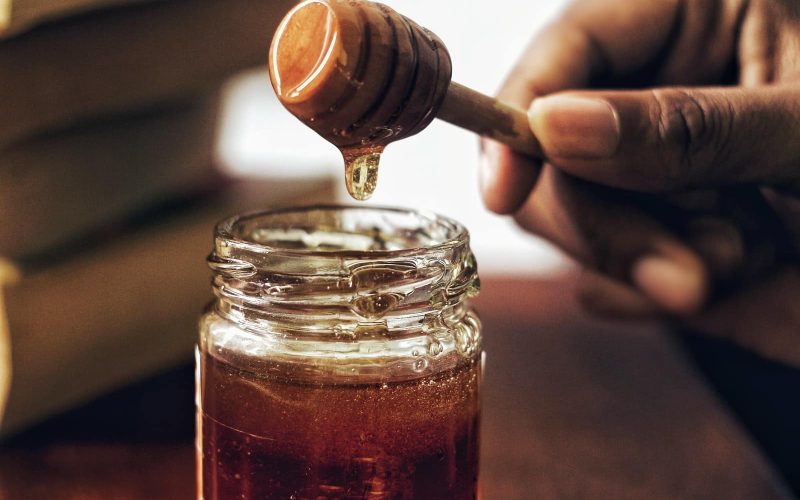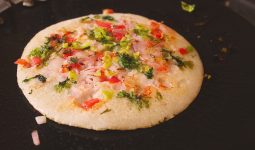Finding the best substitute for honey isn’t just about sweetness. You want an alternative that mimics honey’s texture, health benefits, and natural flavor.
Whether you’re vegan, watching your sugar intake, or just ran out of honey, several options can work for you.
Maple syrup offers a rich flavor and can replace honey in most recipes. It’s a natural sweetener and provides additional nutrients like riboflavin and manganese.
Another good option is agave nectar, which comes from cacti plants and has a lower glycemic index compared to honey, making it a healthier option for some.
Brown sugar is also a viable substitute, especially in baking, where its caramel flavor shines through.
Though it’s a dry ingredient, it still delivers a rich sweetness similar to honey.
Explore these alternatives to find the best fit for your needs.
Erythritol
Erythritol is a great vegan-friendly substitute for honey. This sweetener offers a similar level of sweetness without the calories found in honey.
It works well in many recipes, especially in baking. You can use it in a 1:1 ratio for honey, making it easy to adjust your recipes.
Erythritol is popular among those on a low-carb or keto diet. It’s known for not impacting blood sugar levels, which is a big plus for many people.
Other alternatives you might consider include monk fruit sweetener and liquid stevia, which also offer calorie-free sweetness.
Erythritol can replace honey in baked goods, barbecue sauces, and hot beverages without changing the consistency too much.
Compared to honey, erythritol provides the sweetness you crave without the added sugars, making it a healthier option for those watching their sugar intake.
If you are trying other honey substitutes, you might want to try maple syrup, date syrup, or molasses. Each of these alternatives brings its own unique flavor to your dishes.
Erythritol stands out for its versatility and health benefits, making it an excellent choice for your cooking and baking needs.
For more information on honey substitutes, you can check out this guide.
Corn Syrup
Corn syrup is a popular substitute for honey, especially in baking. It’s known for its similar consistency and sweetness. You can use it in a 1:1 ratio when replacing honey in your recipes.
Corn syrup is vegan-friendly, which makes it an excellent choice for those following a vegan diet.
When you use corn syrup, your dish will have a mild, sweet taste that doesn’t overpower other ingredients. Compared to honey, corn syrup is less likely to crystallize, ensuring a smooth consistency in your recipes.
You can find light and dark molasses versions of corn syrup. Light corn syrup has a clear appearance and is less intense in flavor. Dark corn syrup has a stronger taste and darker color, which can add a rich, deep flavor to your dishes.
If corn syrup isn’t available or if you prefer other options, consider these sweet alternatives:
- Golden Syrup: Another great honey substitute with a similar consistency.
- Maple Syrup: Offers a distinct, natural sweetness but has a different flavor profile.
- Barley Malt Syrup: Provides a unique, malted flavor that works in various recipes.
- Brown Rice Syrup: A less sweet option but still effective in baking.
Experiment with different honey substitutes to find what works best for your recipes and taste preferences.
Brown Sugar
Brown sugar serves as a reliable honey substitute in many recipes. Its main advantage is its sweetness, which closely matches that of honey.
How to Substitute
When using brown sugar as a honey alternative in baking, substitute each cup of honey with 1 1/4 cups of brown sugar and 1/4 cup of water. This helps maintain the right consistency and moisture in your recipe.
Types of Brown Sugar
- Light Brown Sugar: Has a milder flavor and less intense color.
- Dark Brown Sugar: Contains more molasses, giving it a richer taste and darker color.
Adjustments Needed
Since brown sugar is granulated, unlike honey, you will need to adjust the liquid content in your recipe. The added water compensates for the missing liquid from the honey.
Suitable Recipes
Brown sugar works well in baking items like cookies, cakes, and muffins. It also fits in sweet sauces and dressings.
Vegan-Friendly
Brown sugar is vegan-friendly, making it a preferred substitute in plant-based recipes. Ensure the sugar you use hasn’t been processed with bone char, which some brands do to refine sugar.
Alternative Sweeteners:
- Maple Syrup
- Agave Nectar
- Molasses
Each substitute has its unique flavor and texture. You can switch these based on your preference and the recipe you are making.
Read more about using brown sugar as a substitute at LEAFtv.
Learning how to adjust recipes with these substitutes ensures your dish turns out delicious every time.
Maple Syrup
Maple syrup serves as a great substitute for honey in many recipes. It is vegan-friendly and provides a lovely sweetness. If you’re baking, you can usually use a 1:1 ratio. This means if a recipe calls for one cup of honey, you can use one cup of maple syrup instead.
Why Choose Maple Syrup?
- Natural Sweetener: Maple syrup is made from the sap of maple trees, making it a natural alternative.
- Consistency: Its thick consistency is quite similar to honey, which helps keep the texture of your dishes intact.
- Flavor: While it does have a distinct maple flavor, it complements many recipes well.
How to Use It
In cooking and baking, maple syrup works well in a variety of dishes. Whether you’re making marinades, dressings, or baked goods, this sweetener can fit seamlessly into your recipes.
Comparisons with Other Sweeteners
- Golden Syrup: Also a good honey substitute, but it has a different flavor profile.
- Molasses: Dark molasses offers a deeper flavor, while light molasses is milder.
- Date Syrup: Another vegan option, but with a fruitier taste.
- Agave Nectar: Often used similarly but slightly thinner in consistency.
Cooking Tips
- Adjust sweetness if necessary, as maple syrup can sometimes be less sweet than other options.
- Use in moderation: Maple syrup can be potent, so always taste as you go.
When using maple syrup as a honey substitute, you get a delicious hint of maple while keeping your dish just as sweet. Enjoy your cooking and baking with this versatile ingredient!
Molasses
Molasses is a great option when you need a substitute for honey. It’s a thick, dark syrup made during the sugar-making process. You can find light or dark molasses. Light molasses has a milder flavor, while dark molasses is richer and more robust.
How to Use Molasses as a Honey Substitute
You can use molasses in a 1:1 ratio for honey in most recipes. This works well in baking and cooking, giving your dishes a deep, caramel-like flavor.
Example:
- If your recipe calls for 1 cup of honey, use 1 cup of molasses instead.
Vegan-Friendly Option
Molasses is vegan-friendly, making it an excellent alternative for honey if you’re following a vegan diet. It pairs well with other natural sweeteners like agave nectar or maple syrup to enhance the flavor of your dishes.
Recipes and Uses
You can use molasses in a variety of recipes:
- Breads and muffins: Adds moisture and a rich taste.
- Sauces and marinades: Gives a sweet and savory balance.
- Cookies and cakes: Enhances sweetness and depth.
Comparison with Other Sweeteners
While molasses is less sweet than honey, it offers unique benefits. You may also consider other honey substitutes like date syrup, barley malt syrup, or golden syrup if you need a different flavor or sweetness level. Each sweetener brings its unique taste and texture to your recipes. For a sweeter alternative, you might try monk fruit sweetener or liquid stevia.
By choosing molasses, you add rich flavor to your dishes, making it a versatile addition to your kitchen.
Maple Sugar Powder
Maple sugar powder is a great vegan-friendly option for those looking to replace honey. Made from dehydrating maple syrup, it shares similar sweetness but comes in granulated form.
You can use this powder in various recipes. It works well in baking, providing a unique flavor. Substitute honey with maple sugar powder at a 1:1 ratio for easy swaps.
Pros:
- Has a unique, rich taste.
- Vegan and natural.
- Comes in a convenient, easy-to-use powder form.
Cons:
- Can be pricier than other substitutes.
- Might be hard to find in regular stores.
In recipes that call for a liquid honey substitute, you can rehydrate maple sugar powder with water. Just mix equal parts powder and water to get a consistency similar to liquid honey.
Maple sugar powder enhances the taste of cookies, cakes, and even savory dishes. You may find it useful in recipes where the flavor of honey might overpower other ingredients. This powder blends well in dry mixes and batters, making it perfect for baking.
For alternative honey substitutes, you could consider agave nectar, date syrup, or monk fruit sweetener. Each has its own unique properties and can be used in different culinary contexts.
Enjoy experimenting with maple sugar powder in your kitchen—it may become your new favorite sweetener!
Golden Syrup
Golden syrup is a fantastic substitute for honey. It’s vegan-friendly and provides a similar level of sweetness. This syrup is made from sugar, water, and a touch of lemon juice, giving it a recognizable golden color and thick consistency.
Use golden syrup in a 1:1 ratio as a direct substitute for honey in your recipes. It works especially well in baking, adding a subtle caramel flavor to cookies, cakes, and even homemade granola.
You might find golden syrup as part of other dishes too, like drizzling over pancakes or waffles. Its unique flavor profile makes it a versatile ingredient in your kitchen.
Alternatives Similar to Golden Syrup
- Maple Syrup: Also works well in a 1:1 ratio.
- Light Corn Syrup: Has a similar sweetness and color, great for baking.
- Rice Malt Syrup: Another good honey substitute with a mild flavor.
Key Points:
- Vegan-Friendly
- 1:1 Ratio for easy substitution
- Ideal for baking and drizzling
- Adds a subtle caramel flavor
Using golden syrup as a honey alternative lets you enjoy a similar taste and texture while being friendly to vegan diets. It’s an excellent choice for both daily use and special recipes.
Stevia
Stevia is a popular choice for those looking for a honey substitute. This sweetener comes from the leaves of the stevia plant and is both vegan-friendly and low in calories, making it a healthy alternative.
Sweetness
Stevia is much sweeter than honey, so you need less of it. For instance, you can use 1/3 teaspoon of liquid stevia to replace 1/4 cup of honey in recipes.
Forms of Stevia
Stevia is available in several forms including:
- Powdered Stevia
- Liquid Stevia
- Stevia Blends (mixed with other sweeteners like monk fruit)
Using Stevia in Recipes
You can use stevia in various recipes, from drinks to baked goods. When baking, make sure the recipe maintains proper consistency since stevia doesn’t provide the same bulk as honey. Often, you might need to add other ingredients like apple sauce or mashed bananas to keep the texture right.
Combining Stevia with Other Sweeteners
For balance, you can blend stevia with other natural sweeteners. For example, replace half the honey in a recipe with date syrup or mix it with maple syrup.
Simple Syrup Option
Create a simple syrup by mixing 1/2 cup of water with 4 teaspoons of stevia. This works well in drinks or recipes needing a liquid sweetener.
Stevia serves as a versatile and healthy substitute for honey, fitting into many types of diets including vegan and keto.
Coconut Sugar
Coconut sugar makes a great vegan-friendly substitute for honey. It has a lower glycemic index and is less processed. Plus, it adds a hint of caramel flavor.
When using coconut sugar in your recipes, you can often use a 1:1 ratio. This makes it easy to swap out honey without having to adjust the amounts too much.
Sweetness level is a bit lower compared to honey, so you might need to use slightly more depending on your taste preferences. Keep in mind that it doesn’t dissolve as easily as liquid sweeteners.
Coconut sugar works well in baking and cooking. It maintains a similar consistency as brown sugar, making it ideal for cookies, cakes, and other baked goods. If you’re looking for a honey alternative with similar moisture content, consider combining it with other liquid sweeteners like maple syrup.
It’s also a fantastic option for those following a diet free of refined sugars. Coconut sugar is less likely to spike blood sugar levels and offers some trace nutrients.
Notable alternatives to coconut sugar include barley malt syrup, brown rice syrup, and date syrup. Each offers unique flavors and textures that can enhance your dishes, depending on the specific needs of your recipes.
Switching to coconut sugar gives you a versatile and healthier substitute for honey that fits well into both sweet and savory recipes.
Raw Sugar
Raw sugar is a great substitute for honey in many recipes. This unrefined sugar comes in larger crystals and retains more molasses than white sugar.
You can use raw sugar in a simple 1:1 ratio when replacing honey in baking. This makes the switch easy and keeps your recipe consistent.
Benefits of Raw Sugar
- Vegan-Friendly: Raw sugar is plant-based, which makes it perfect for vegan recipes.
- Sweetness: It has a slightly less intense sweetness compared to honey, giving a more subtle flavor.
- Versatile: You can use it in various dishes, like baking and cooking.
Raw Sugar vs. Other Substitutes
- Maple Syrup: Both maple syrup and raw sugar are natural sweeteners but they differ in consistency and flavor.
- Molasses: Raw sugar includes some dark molasses, giving it a rich taste.
Simple Uses
- Sprinkle raw sugar on top of baked goods for a crunchy texture.
- Mix it into your sauces or marinades for a touch of sweetness without overpowering the dish.
Raw sugar doesn’t dissolve as easily in liquids as honey, so it works best in recipes where the sugar gets plenty of time to blend in, like slow-cooked dishes or baked goods.
If you’re looking for other honey substitutes, consider trying maple syrup, agave nectar, or molasses. Each of these has its own unique flavor and can be used in different recipes.
Date Paste
Date paste is a fantastic honey substitute that you can easily make at home. It’s both vegan-friendly and naturally sweet.
To make date paste, you need a cup of pitted dates, which is about 250 grams. Soak the dates in warm water until they become soft. Then, blend them into a smooth paste.
Pros of Date Paste:
- Vegan-friendly: Completely plant-based and suitable for vegan recipes.
- Sweetness: Offers a rich, natural sweetness similar to honey.
- Consistency: Thick and smooth, ideal for baking.
You can use date paste in a 1:1 ratio when substituting it for honey in most recipes. This means if a recipe calls for one cup of honey, you can use one cup of date paste.
Here’s a quick table for some commonly used measurements:
| Honey (cups) | Date Paste (cups) |
|---|---|
| 1/4 cup | 1/4 cup |
| 1/3 cup | 1/3 cup |
| 1/2 cup | 1/2 cup |
| 1 cup | 1 cup |
When baking, date paste works well in cakes, cookies, and other desserts. Keep in mind that unlike honey, date paste contains fiber, which can slightly alter the texture of your baked goods.
Alternative Substitutes:
- If you need another vegan option, consider maple syrup or molasses.
- For recipes needing a light flavor, agave nectar or monk fruit sweetener works great.
Using date paste not only sweetens your recipes but also adds a bit more nutritional value than traditional sweeteners like white sugar or golden syrup.
Agave Syrup
Agave syrup, also called agave nectar, is a common alternative to honey. It’s vegan-friendly and boasts a similar sweetness.
You can use agave syrup in a 1:1 ratio when substituting it for honey. For example, if a recipe calls for 1 cup of honey, you can use 1 cup of agave syrup instead. This keeps the consistency and sweetness level the same.
In Baking: When baking with agave syrup, be mindful of its liquid consistency. It fits well in recipes for cakes, cookies, and muffins. If you replace honey with agave syrup, you might need to reduce other liquids in the recipe slightly to maintain the right texture.
Agave syrup can work well in both sweet and savory dishes. Drizzle it over pancakes or mix it into salad dressings. It also works well for sweetening beverages like tea or coffee.
If you want to try other honey substitutes, consider barley malt syrup, brown rice syrup, or maple syrup, each bringing unique flavors to your recipes.
Using agave syrup is a straightforward switch for anyone looking to avoid honey, whether for dietary reasons or a change in flavor.
Fructose
Fructose is a simple sugar found in many fruits. It’s naturally sweet and can be a great vegan-friendly substitute for honey. You often find fructose in its pure crystalline form, which looks and tastes much like table sugar.
Fructose has a higher sweetness level compared to honey. This means you can use less of it to achieve the same sweetness. In recipes, substituting honey with fructose can be done at a 1:1 ratio, though you might want to adjust the amount based on taste.
When using fructose, it is important to consider that it may not have the same thick consistency as honey. This might affect the texture of your baked goods. For example, cookies made with fructose might spread more than those made with honey.
Fructose works well in various recipes, from baking to sauces. It’s a great alternative if you’re avoiding honey for dietary reasons. You can replace honey with fructose in recipes for a lighter, sweeter touch.
While fructose is a good substitute, you might also consider other alternatives like maple syrup or agave nectar. These options provide different flavors and consistencies, giving you flexibility in your recipes.
Allulose
Allulose is a popular honey substitute. This low-calorie sweetener is great for those looking for a healthier option.
Sweetness: Allulose is about 70% as sweet as sugar. You might need to adjust the amount when replacing honey in recipes.
Recipe Use: Use 1 1/3 cups of allulose to replace 3/4 cup of honey. This ratio helps match the sweetness and liquid consistency.
Benefits:
- Vegan-friendly: Unlike honey, allulose is plant-based.
- Helps maintain blood sugar levels, making it a good choice for keto diets.
Consistency:
- Allulose can mimic honey’s texture. It’s perfect for baking, sauces, and beverages.
Vegan-Friendly Alternatives:
Consider other options like monk fruit sweetener or maple syrup if you’re exploring more vegan substitutes.
Comparison with Honey:
Allulose is less sweet than honey but works well in recipes. Its lower calorie content makes it a healthier choice.
Uses in Recipes:
- Baking: Allulose works great in cookies and cakes.
- Sauces: Adds sweetness without altering the flavor.
- Beverages: Dissolves easily in liquids, making it perfect for coffee or tea.
Note: When replacing honey with allulose, always add a bit more allulose to match the desired sweetness in your dishes.
Barley Malt Syrup
Barley malt syrup is a thick, dark syrup made from sprouted barley. It has a less sweet taste compared to honey but provides a rich, malted flavor.
This syrup contains sugar and carbohydrates, making it a high-calorie sweetener. It has a low glycemic index (GI), which means it releases sugar into your bloodstream more slowly. This can be helpful for managing blood sugar levels, especially if you have diabetes.
You can use barley malt syrup in various cooking applications. Its thick texture makes it useful in baking breads and bagels. It also works well in sauces and marinades, adding depth and a touch of sweetness.
When substituting for honey, use an equal amount of barley malt syrup. It’s less sweet, so you might need to add extra brown sugar or white sugar to achieve the desired sweetness. While not as common as honey, it pairs well with other sweeteners like coconut sugar or corn syrup.
Barley malt syrup holds up well to heat, making it suitable for recipes that require cooking. Because it has a malty flavor, it complements hearty and robust dishes. It’s a great alternative if you are looking for a unique taste in your sweetener options.
Rice Syrup
Rice syrup is a popular substitute for honey. It is made from fermented rice and has a mild, sweet flavor.
Nutrition
- Calories: Rice syrup has more calories than honey.
- Carbohydrates: It is high in carbohydrates.
- Glycemic Index (GI): It has a higher GI, which might not be suitable for diabetics.
Cooking Uses
Rice syrup works well in baking and cooking. It’s great for making sauces and dressings.
Texture
Rice syrup has a thick, sticky texture. This makes it similar to honey and easy to use in recipes.
Sugar and Sweeteners
If you need a sweetener, rice syrup can replace brown sugar, white sugar, or corn syrup. Unlike high-fructose corn syrup, rice syrup is less processed.
Heating
You can heat rice syrup without changing its sweetness. This makes it useful for recipes that need to be cooked or baked.
Comparisons
- Honey vs. Rice Syrup: Honey has more flavor and fewer calories.
- Brown Rice Syrup: This is often confused with rice syrup but is slightly different in taste and uses.
Rice syrup is a good option if you’re out of honey. It’s versatile, natural, and fits well in many recipes. For more information, you can check out this article on brown rice syrup substitutes and how to use them.
Date Syrup
Date syrup is a wonderful alternative to honey. It comes from dates and offers a rich, caramel-like flavor. You can use it in various recipes, especially where you want a deep, sweet taste.
Nutritional Value
Date syrup contains sugar, but it’s lower on the GI index compared to honey. This makes it a better choice for people with diabetes. It also has fewer calories per serving, which can help you manage your diet better.
Cooking and Baking
You can use date syrup in the same way as honey in cooking and baking. It works well in sauces, marinades, and dressings. Use a 1:1 substitution ratio for honey. This means if your recipe needs one cup of honey, use one cup of date syrup.
Texture and Sweetness
The texture of date syrup is thicker than honey. If you need to thin it out, warm it gently over heat. Date syrup is a natural sweetener, making it ideal for recipes that call for brown sugar or coconut sugar.
Comparisons
When comparing date syrup to other substitutes, it holds up well. For instance:
- Maple syrup: 1/3 cup of maple syrup replaces one cup of date syrup.
- Agave nectar: Another good substitute, less sweet but useful in many recipes.
- Monk fruit syrup: Less common, but an option for low-calorie needs.
Practical Uses
Date syrup can be drizzled over pancakes, mixed into yogurt, or added to smoothies. It’s also fantastic spread on toast. Plus, it can replace white sugar and raw sugar in many dishes, making it a versatile pantry staple.
Monk Fruit Sweetener
Monk fruit sweetener is a popular alternative to honey. It’s known for being low in calories and suitable for people with diabetes. Monk fruit sweetener has a zero glycemic index (GI), meaning it won’t spike your blood sugar levels.
Ratios for Substituting Honey
When you’re substituting honey with monk fruit sweetener in your recipes, use these ratios:
- 1 tablespoon honey = ¼ teaspoon monk fruit sweetener
- ¼ cup honey = 1½ to 2 teaspoons monk fruit sweetener
- ½ cup honey = 3 to 4 teaspoons monk fruit sweetener
- 1 cup honey = 6 to 8 teaspoons monk fruit sweetener
Effects on Texture and Moisture
Monk fruit sweetener lacks the moisture honey provides. This can affect the texture of baked goods and sauces. Add more liquid to balance the moisture levels.
Usage in Cooking and Baking
You can use monk fruit sweetener in many recipes, including baked goods, sauces, and beverages. It holds up well under heat, making it versatile for a variety of dishes.
Nutritional Information
Since monk fruit sweetener is low in calories and carbohydrates, it’s a good choice if you’re watching your calorie intake. It works well as a substitute for sugar, including brown sugar and coconut sugar.
Comparisons with Other Sweeteners
Monk fruit sweetener is often compared to other sweeteners like stevia, erythritol, and allulose. Each has unique properties, so you might prefer one over another depending on your needs. For more on this, you can read about Monk Fruit Sweetener vs Honey.
Using monk fruit sweetener can be a healthy and effective way to sweeten your food without the extra calories or carbs.








